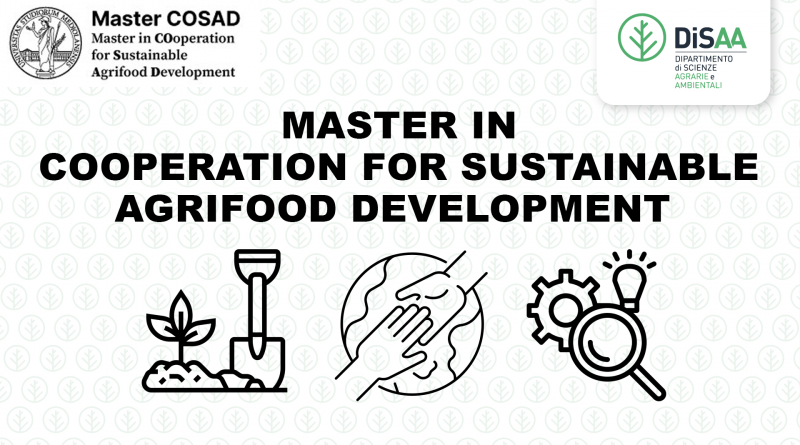Masters Course in Cooperation for Sustainable Agrifood Development
It is crystal clear in these tragic days of war, how far the world is intertwined and how political instability in a region of the world has transversal consequences even thousands of kilometres away.
Overall, Russian and Ukrainian agri-food exports account together for 12 % of total calories traded around the world, and while we complain about the increase in prices of raw material, in many African countries the proportion of the population at risk of food insecurity, already close to a 20 % rate, is threatened by the escalation on the price of wheat and corn, which could have dramatic consequences in terms of food stability for the whole population.
According to FAO today, around 795 million people worldwide (one out nine people) suffer from undernutrition and global food demand is expected to increase by 35 % by 2030. As we have already stated on several occasions in this blog, there is no macro-theme among the 17Sustainable Development Goals — the United Nations Sustainable Development Goals — not closely linked to agricultural activities. Today and even more in the upcoming decades, agriculture is called upon to produce sufficient, safe and high-quality food to feed the growing world population, and to help recover the current imbalances, yet using renewable resources.
Let’s go back to the situation in Africa.
The ownership land-structure is fragmented, with a clear majority of micro farmers organised for self-consumption and who are unable to cope with the necessary investments in order to make the leap in quality. There is still a lack of constant and widespread supply of the means of production, which entails a very high degree of risks and fragility, and reduces the efficiency and competitiveness of the production system. It is also difficult to find fertilisers and agromedicines at reasonable prices because of a lack of trade agreements. In many cases, there is also no stable livestock production supplying animal fertilisers. In short, it is necessary to improve the situation, by considering the above mentioned concept of interconnectivity. But ensuring safe products means considering the whole food production chain at all stages as a single process for action. An effective food safety policy requires risk assessment and monitoring, effective regulatory action to manage risks and control systems.
This is why we launch the Masters Course in Cooperation for Sustainable Agrifood Development aimed at those who believe that fostering rural development based on fair and sustainable agriculture is the key to ensuring food security in the world.
Training objectives
The Masters Course aims to build technical expertise to help design, implement and evaluate rural, agricultural and agri-food development interventions in countries with limited economic resources. At the same time, it provides the tools to understand and interpret the social and economic context and guide development pathways, projects and interventions, towards sustainability.
The courses provided by the Masters degree tackles the problem from different disciplinary areas including agricultural and veterinary sciences, biological sciences, chemical sciences, civil engineering and architectural engineering, historical sciences, philosophic sciences, pedagogical, psychological, economic and statistical sciences, and political and social sciences.
Method
The Masters degree is in English.
The training formats will be of three types:
- Face-to-face lessons (delivered in hybrid presence/streaming) to improve candidates’ professional knowledge and skills;
- Practical exercises to hands-on the use of professional working tools;
- In-depth workshops focusing on case studies. External teachers from civil society, private companies, as well as around 20 NGOs with whom the Masters collaborates and who will play a key role in the integration of candidates into the professional world of international cooperation, are also involved in the management of the seminars.
Professional outlets
Students are trained to become international cooperation experts.
both from a managerial and technical management point of view. In particular, positions may be held in the following organisations:
- Non-governmental (and Third Sector) organisations;
- Community institutions and agencies;
- Italian Development Cooperation Agency (AICS);
- Local authorities;
- Professional advice for Italian, Community and international institutions;
- Fellowship at the United Nations;
- EU-funded European Voluntary Humanitarian Aid Volunteering;
- European Voluntary Service;
- CRUI internships at diplomatic representations abroad.
Background requested
The Masters degree is designed to welcome and train students who proficiently speak English language and have a basic background (3-year degree or equivalent) in at least one of the subjects listed: Biotechnology; Biological sciences; Agricultural and forestry science and technology; Agro-food science and technology; Science and Technology for Environment and Nature; Zootechnics and Animal Production Technologies; Economic sciences; Economics and business management sciences; Spatial Planning, Urban Planning, Landscape and Environmental Sciences; Geography; Civil and Environmental Engineering; Political and International Relations Sciences; Social Sciences for Cooperation, Development and Peace.
Additional information:
Official Website: https://sites.unimi.it/mastercosad/

